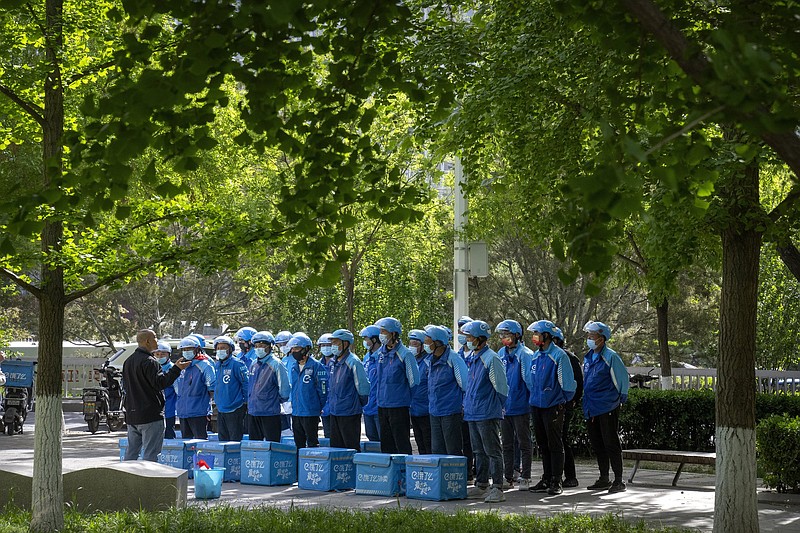Companies from Microsoft to Texas Instruments that long benefited from supply chains that run through China are now paying a price for the country's sweeping lockdowns that have confined millions to their homes.
Texas Instruments, which supplies semiconductors to automakers and tech companies, cut its revenue forecast Tuesday by about 10% because customers shuttered plants and reduced operating levels in China. The same day, Microsoft said the current lockdowns have affected its performance and extended shutdowns would hurt its ability to produce Xbox game consoles and Surface laptops.
South Korean memory chipmaker SK Hynix Inc. warned Wednesday that any recovery in the smartphone and computer markets hinges on China's policy approach to covid-19. Hynix owns facilities in Wuxi and Chongqing, and supplies companies such as Apple Inc., whose largest iPhone manufacturing facility is in Zhengzhou.
"The biggest demand factor would be the lockdowns," said Myoungsoo Park, a Hynix marketing executive, referring to orders from companies with supply chains in China. "Depending on how they unfold in the future, there will be some questions that still remain with regard to the uncertainties over demand in the second half."
For decades, companies shifted production into China because of the benefits of low-cost labor, a massive domestic market and supportive government policies. Apple Chief Executive Officer Tim Cook helped pioneer the China-centric model, building the world's most valuable company by centralizing assembly in the country as components were shipped in from around the globe.
But the Covid pandemic exposed risks from the strategy never before contemplated. Factories closed, while shipping costs surged. Lockdowns in Shanghai, a city of 25 million, have exacerbated the troubles, and now may spread to Beijing. Xi Jinping's administration has embraced a strict Zero Covid policy to show the Communist Party's power in stopping the pandemic's spread.
More broadly, China's policies for stamping out Covid are rippling the world's No. 2 economy, putting Beijing's 5.5% growth target increasingly in question. The uncertainty, coupled with inflationary pressures, is expected to hammer consumer demand for high-cost discretionary items like the smartphones, electric vehicles and laptops.
China's industry regulator has vowed to keep the country's supply chain "unimpeded" following Xi's order to mitigate the pandemic's impact on the economy. Still, key industrial parks remain inaccessible for trucks.
Scores of companies have addressed the impact of China's policies on earnings or have been asked about it in the past week, according to a Bloomberg review of conference call transcripts. They range from giants like General Electric Co. and Pepsico Inc. to lower-profile companies that play a critical role in global supply chains.
AU Optronics Corp., a Taiwanese company whose customers include Samsung Electronics Co. and HP Inc., explained Tuesday that lockdowns in China have increased the complexity of everything from production to recruitment.
"The materials we lack can change every day," said Paul Peng, the company's chief executive. "Today it would be chemical materials, tomorrow it would be something else. We have to monitor what materials we are short of on a daily basis."
The company has lost 30% to 40% of its capacity at its business in Kunshan, while other Chinese units are under different levels of restrictions, Peng said. AU Optronics said it is difficult to give guidance for the second quarter because of the unpredictable situation.
James Yang, president of Taiwan's Innolux Corp., explained that consequences of China's lockdowns will be far-reaching.
"The impact will continue to show in the second and third quarter," said Yang, whose customers include Samsung and General Motors Co.
Automakers have been hit too. Tesla lost about a month of work during the Shanghai shutdown. Continental, Europe's second-largest maker of car parts, lowered its growth forecast for global production of passenger cars and light commercial vehicles to a range of 4% to 6%, from 6% to 9% previously.
While Texas Instruments cut its revenue outlook, the company said it isn't seeing widespread order cancellations. That may suggest the problems are more about logistics than a broader drop in demand for electronics.
"There are many customers that are just shut down -- they're not taking deliveries," Chief Financial Officer Rafael Lizardi said in an interview.
Others saw the lockdowns depressing consumer spending. Executives at MediaTek Inc., which supplies mobile chips to Samsung and Xiaomi Corp., told investors Wednesday it was trimming its outlook for global smartphone shipments from single-digit percentage growth to flat, at about 1.35 billion units. That's driven in large part by a bigger decline in China than originally anticipated, they said.
Microsoft reported strong earnings for the first quarter, driven by cloud computing services. But it flagged that its ability to source the Xbox and other hardware could get hit if it remains challenging to move people and products around China.
"Production delays even early in May can obviously have a big impact on the quarter," said Chief Financial Officer Amy Hood. "So, we're watching it."
It's so far unclear how Apple, which depends on hundreds of suppliers throughout China, will be able to navigate the lockdowns. The Cupertino, Calif.-based company reports earnings April 28.
Foxconn Technology Group, the primary assembler of iPhones, has said that its plant in central China has continued to operate despite a lockdown of the area. Called iPhone City, the facility has switched to a closed-loop system under which employees remain on site and can't travel widely. Under the local rules, workers for key businesses can commute with permits.
Information for this article was contributed by Huang Zhe, Derek Wallbank, Ian King and Gao Yuanof Bloomberg News.
